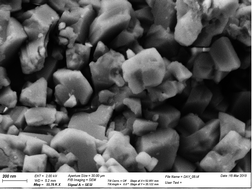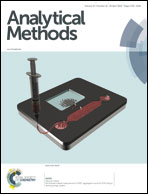Adsorption and HPLC of carbohydrates and related hydroxy compounds on zeolites†
Abstract
Carbohydrates, sugar alcohols, and other hydroxy compounds were separated on a HPLC-column filled with dealuminated hydrophobic Y zeolite with water as eluent. Disaccharides show a greater retention and selectivity than monosaccharides. The selectivity for monosaccharides is in the same range compared with established stationary phases but significantly greater for disaccharides and trisaccharides. When a usual hydrophilic Y zeolite is used, either exchanged by K+ or Ca++, all disaccharides are excluded from the micropores and only monosaccharides can be separated. A hydrophobic MOR type zeolite with somewhat smaller pore geometry also excludes the disaccharides while an acceptable selectivity was observed for monosaccharides and other small hydroxyl compounds. The separation can be limited by diffusion of the solutes inside the micropores. Therefore, the separation can be improved by enhancing the temperature. The linear correlation of the dynamic separation process with the static adsorption equilibrium measured after 24 h is limited to low solute–zeolite interactions.



 Please wait while we load your content...
Please wait while we load your content...